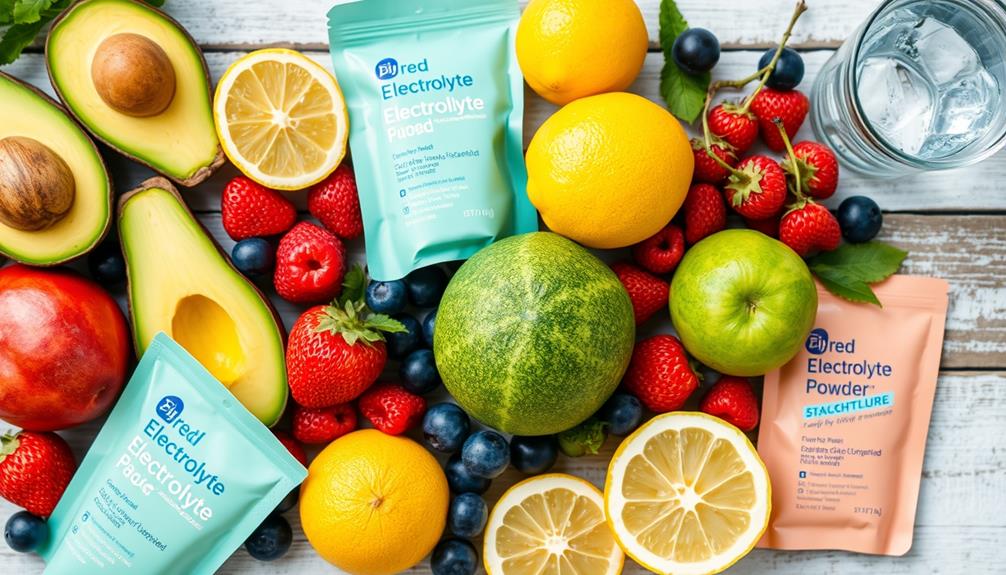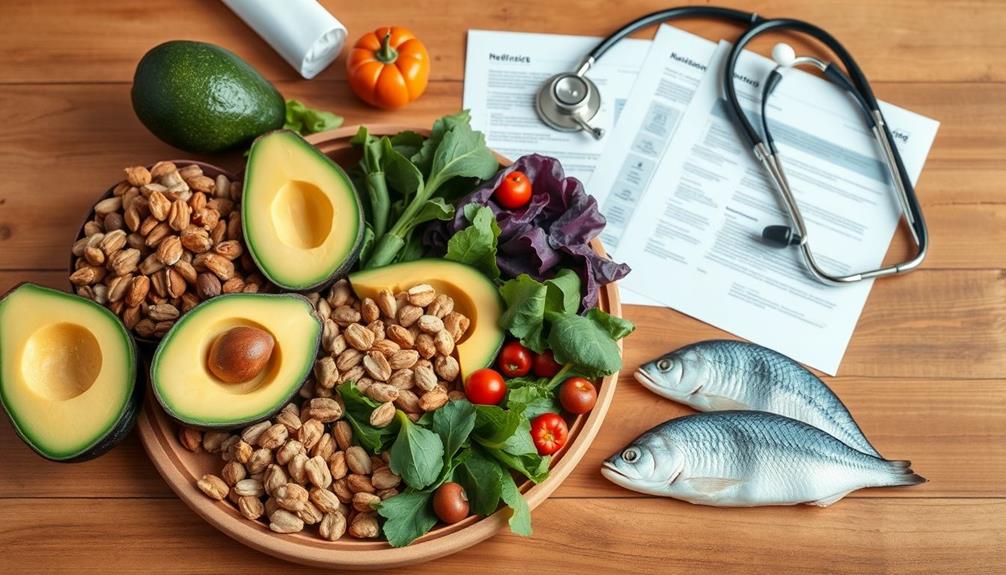The best electrolytes for your keto diet are key to staying energized and balanced. You should focus on sodium, potassium, and magnesium, as they support muscle function and hydration while preventing pesky keto flu symptoms. Top supplements like Perfect Keto Daily Electrolytes Powder and LMNT Recharge can help you meet your needs. Aim for 3–7 grams of sodium and 3,000–4,700 mg of potassium daily. Remember that monitoring your intake can enhance your overall experience on keto. There's a lot more to explore about keeping your electrolytes in check to maximize your keto success.
Key Takeaways
- Essential electrolytes for the keto diet include sodium, potassium, and magnesium to support hydration and nerve function.
- Recommended sodium intake ranges from 3 to 7 grams daily; potassium should be between 3,000 to 4,700 mg.
- Effective supplements include Perfect Keto Daily Electrolytes, LMNT Recharge, and Ultima Replenisher for optimal balance and hydration.
- Monitoring symptoms like fatigue and cramps can help gauge electrolyte levels and prevent keto flu.
- Consult healthcare professionals for personalized electrolyte needs based on activity levels and dietary changes.
Overview of Keto and Electrolytes

To stay on track with your keto journey, it's vital to monitor your electrolytes, particularly sodium, potassium, and magnesium.
These key electrolytes play essential roles in nerve function, muscle contractions, and hydration. Incorporating a balanced diet rich in whole foods can help support your electrolyte levels. Without adequate amounts, you may find your performance and overall wellness suffer.
Electrolyte supplementation can be a lifesaver, helping you mitigate symptoms of deficiency. Pay attention to your activity level and dietary changes, as these factors can influence your electrolyte needs.
Regularly checking your levels and adjusting your intake can keep those pesky symptoms at bay, allowing you to thrive on your ketogenic diet. Staying proactive about your electrolytes will help guarantee that you feel your best while enjoying the benefits of keto.
Importance of Electrolytes in Keto

When you start a keto diet, managing your electrolytes is essential to avoid keto flu symptoms like headaches and fatigue.
Electrolytes are crucial for many bodily functions, including muscle contractions and nerve signaling, which can be affected during dietary changes. Sodium and potassium play a critical role in maintaining your body's fluid balance, especially as your insulin levels drop and lead to increased nutrient loss.
Ensuring you get enough of these electrolytes can make your change to keto much smoother, while considering common types of cold medications can also help manage any symptoms you might experience during this dietary shift.
Keto Flu Symptoms
Many people experience a range of symptoms known as Keto Flu during the initial stages of a ketogenic diet, which can include fatigue, headaches, and muscle cramps. These symptoms arise from electrolyte imbalances due to reduced carbohydrate intake, leading to increased sodium and potassium loss. It's vital to monitor your electrolyte levels closely.
| Symptoms of Keto Flu | Electrolyte Affected | Recommended Supplement |
|---|---|---|
| Fatigue | Sodium | Keto electrolyte powder |
| Headaches | Potassium | Electrolyte supplementation |
| Muscle cramps | Magnesium | Magnesium supplements |
| Brain fog | Sodium & Potassium | Combined electrolyte mix |
Electrolyte supplementation is essential for alleviating these symptoms. Maintaining adequate sodium intake is especially important, as low-carb diets can lead to sodium deficiency, worsening symptoms like fatigue and headaches. Additionally, a magnesium deficiency can contribute to muscle cramps and irritability. Regular consumption of keto-friendly electrolyte mixes can greatly reduce the severity of Keto Flu symptoms, enhancing your comfort during this dietary change. Don't hesitate to incorporate these solutions into your routine!
Sodium and Potassium Balance
To stay on track, aim for a sodium intake of 3 to 7 grams daily—much higher than the general recommendation of 2.3 grams. This adjustment is essential for maintaining energy levels and avoiding discomfort, especially when you consider the importance of a budget for managing expenses related to dietary changes.
For potassium, you should target a daily intake of 3,000 to 4,700 mg. Foods like avocados and spinach are excellent sources that can help you meet your potassium needs.
If you're engaging in high-intensity exercises or just starting the keto diet, consider supplementing your sodium and potassium. This will help mitigate potential deficiencies and keep your electrolyte balance in check.
Top Electrolyte Supplements

Staying properly hydrated on a ketogenic diet often requires additional electrolyte support to maintain balance and energy levels. Choosing the best electrolyte supplements can help you address the common loss of sodium and other essential minerals that occur on keto diets.
Proper hydration is vital for ideal comfort and energy, especially when undergoing dietary changes like keto, which can impact your body's mineral balance, similar to how efficient heating solutions can enhance living quality.
Perfect Keto Daily Electrolytes Powder is a fantastic option, offering zero carbs, calories, and sugar while providing essential electrolytes like sodium, potassium, magnesium, and chloride for $37.99.
If you prefer a high sodium content, LMNT Recharge Electrolyte Drink Mix delivers 1000mg of sodium per serving in a low-carb, sugar-free formula, priced at $45.
For a flavorful hydration choice, consider Ultima Replenisher, which is sugar-free and includes multiple minerals along with 100 mg of vitamin C for $20.99.
Another excellent option is Dr. Price's Electrolyte Mix, known for its great taste and effective hydration support.
Finally, Adapted Nutrition Keto K1000 boasts a rich potassium content of 1,000 mg per serving, along with essential minerals, all with zero carbs, priced at $31.86.
Selecting the right electrolyte supplements can help you stay energized and balanced on your keto journey.
Key Ingredients to Look For

When selecting electrolyte supplements for your ketogenic diet, it's essential to focus on key ingredients that support your body's unique needs.
Sodium is important for maintaining fluid balance and proper nerve function, especially for low-carb dieters. Aim for a daily intake of 3-7 grams to ward off keto flu symptoms, as inadequate sodium can lead to gastrointestinal issues similar to those experienced with certain juice diets.
Potassium plays a significant role in heart health and muscle function, with a recommended intake of 3,000-4,700 mg daily. You can find it in foods like avocados and leafy greens.
Magnesium is another important ingredient, as it aids in energy production and muscle recovery. Aim for around 400 mg daily, sourcing it from foods such as pumpkin seeds and dark chocolate.
Don't forget calcium, which is necessary for bone health and muscle contractions—important for anyone on a keto diet.
Lastly, when choosing supplements, opt for those with zero sugar and prioritize natural flavoring agents. This guarantees you're sticking to a clean ingredient profile that aligns with your keto lifestyle.
Recommended Dosage and Monitoring

Understanding the right dosage and monitoring your electrolyte intake is key to maximizing the benefits of your keto diet. Typical serving sizes for electrolyte supplements usually range from 1 to 2 scoops per day, but this can vary based on your specific product and individual electrolyte needs.
If you're engaging in increased physical activity or intense exercise, you might need to boost your intake to maintain ideal hydration and performance. Staying hydrated is essential, especially since dehydration can affect your overall health and may lead to issues similar to those seen with cranberry juice consumption.
Regular monitoring of your hydration status and electrolyte levels is vital, especially during the early stages of a ketogenic diet. Keep an eye on how you're feeling—tracking symptoms like fatigue, muscle cramps, and headaches can help you gauge the effectiveness of your supplementation.
If you notice any concerning symptoms, it might be time to adjust your dosage. Consulting with a healthcare professional is a smart move to determine your personalized electrolyte needs based on your dietary habits and lifestyle.
Potential Side Effects

While electrolytes are essential for your health, excessive intake can lead to several potential side effects. Consuming too much sodium can result in gastrointestinal issues like bloating and diarrhea. If you have hypertension or cardiovascular disease, high sodium levels may also raise your blood pressure, increasing your health risks.
On the other hand, overconsumption of potassium can lead to hyperkalemia, which poses serious concerns, including heart rhythm disturbances. This is particularly important to keep in mind if you're supplementing heavily or consuming potassium-rich foods without moderation.
Magnesium, while beneficial, can also be problematic in excess. An overdose may cause nausea, diarrhea, and abdominal cramping, impacting your overall gut health and comfort.
To enjoy the benefits of electrolytes while minimizing risks, it's vital to maintain a balanced and moderate approach to supplementation. Monitoring your intake will help you avoid these potential side effects, ensuring your keto diet supports your health rather than jeopardizing it.
Always consult with a healthcare professional if you're uncertain about your electrolyte needs, especially when managing specific health conditions.
Research and Studies on Electrolytes

Research into electrolytes reveals their essential role in supporting those on a ketogenic diet, particularly as low-carb eating can heighten the body's need for these important minerals.
Studies indicate that a low-carb diet can lead to increased sodium and potassium excretion due to lower insulin levels, prompting a greater need for electrolyte replenishment. This is critical for anyone aiming for weight loss, as imbalances can result in symptoms often dubbed "keto flu," like fatigue, headaches, and muscle cramps.
A Cochrane meta-analysis highlights the significance of balanced electrolyte consumption, noting that both low and high amounts of sodium can present health risks.
In addition, research shows that proper electrolyte balance can greatly enhance exercise performance and recovery, especially for athletes on ketogenic diets who require adequate amounts of sodium, potassium, and magnesium.
Ongoing studies continue to refine the ideal ratios and formulations of electrolytes for those on a low-carb diet, addressing hydration needs and overall health outcomes.
For individuals with specific medical conditions, understanding these nuances can lead to better management of their electrolyte intake while following a ketogenic lifestyle.
Customer Experience and Support

When you choose LMNT, you're not just getting a product; you're also gaining access to exceptional support and a hassle-free trial policy.
If you're not satisfied, returning the product for a refund is straightforward, making it easy to trust the brand.
Plus, their customer service is responsive, ensuring you feel valued every step of the way.
Support and Assistance Availability
Customer support can make or break your experience with a product, especially when it comes to something as essential as electrolytes on a keto diet. When you choose a high electrolyte mix, you want to guarantee you're supported throughout your journey.
LMNT stands out for its excellent customer service, addressing complaints quickly and effectively.
Here are three key aspects of their support and assistance availability:
- Responsive Service: LMNT's team promptly handles inquiries, making sure you feel valued and heard.
- Community Engagement: They actively gather customer feedback, which helps refine their products and guarantees you receive the most effective electrolytes, free of added sugar.
- Satisfaction Assurance: With risk-free trials and refunds, you can trust that you're investing in an important electrolyte that's been reviewed by Dr. Price and others, enhancing your confidence in the product.
High reorder rates indicate strong customer satisfaction, and you'll find a supportive community cheering you on as you navigate your keto diet.
With LMNT, you're not just buying electrolytes; you're joining a network committed to your success.
Trial and Refund Policy
With a risk-free trial policy, LMNT makes it easy for you to try their electrolytes without any worries. If you're not satisfied with your purchase, you can request a refund, guaranteeing you only invest in what works for you. This commitment to customer satisfaction sets LMNT apart in the market for the best electrolytes for your keto diet.
LMNT's customer service is highly regarded, with a responsive team ready to address any concerns you may have. If you find that their electrolytes don't meet your expectations, they'll promptly process your refund or offer a new shipment, which enhances your trust in the brand. This immediate support demonstrates their dedication to your experience.
High reorder rates further indicate that many customers are happy with LMNT's products, reflecting their effectiveness and appeal. The company actively engages with its community, gathering feedback to continually improve its offerings.
This responsiveness not only fosters customer loyalty but also guarantees that LMNT remains a top choice for those seeking quality electrolytes. With these robust policies in place, you can feel confident trying LMNT's electrolytes risk-free.
Frequently Asked Questions
What Is the Best Keto Electrolyte?
When you're looking for the best keto electrolyte, consider your hydration needs. Different options like LMNT or Ultima offer varying sodium levels, so choose one that aligns with your activity intensity and personal preferences.
Do You Really Need Electrolytes on Keto?
Did you know that on a low-carb diet, you might lose up to 7 grams of sodium daily? You really need electrolytes on keto to prevent fatigue, cramps, and maintain overall health during your shift.
How Do I Add Electrolytes to My Keto Diet?
To add electrolytes to your keto diet, try using electrolyte powders, consuming potassium-rich avocados, and drinking bone broth. Regularly check your hydration and supplement during exercise to maintain ideal electrolyte balance. Stay energized!
How to Eat 4700 Mg of Potassium a Day on Keto?
To eat 4,700 mg of potassium daily on keto, focus on potassium-rich foods like avocados, spinach, and mushrooms. Consider bone broth and potassium supplements to help reach your goal while enjoying a variety of flavors.
Conclusion
Incorporating the right electrolytes into your keto diet is essential for maintaining balance and energy. Notably, studies show that nearly 70% of people on keto experience electrolyte imbalances, which can lead to fatigue and cramps. By choosing high-quality supplements and monitoring your intake, you can effectively support your body during this dietary shift. So, prioritize those electrolytes, and you'll feel better equipped to enjoy the benefits of your keto lifestyle!









